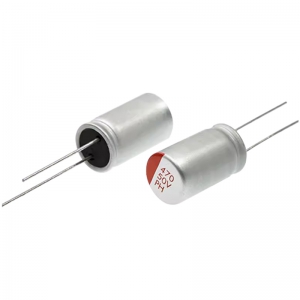
Solid capacitors, also known as solid aluminum electrolytic capacitors or solid tantalum electrolytic capacitors, are capacitors that use solid electrolytes instead of traditional liquid electrolytes. Solid state capacitors are widely used in high-end electronic products due to their excellent performance, especially their stability in high temperature and high-speed charging and discharging environments.
Solid state aluminum electrolytic capacitor:
Solid state aluminum electrolytic capacitors use conductive polymer materials as electrolytes, replacing traditional liquid electrolytes. This electrolyte has the following advantages:
Low ESR (equivalent series resistance): The ESR of solid-state aluminum electrolytic capacitors is much lower than that of traditional liquid electrolytic capacitors, which means lower energy loss and better thermal stability.
High frequency characteristics: Due to low ESR, solid-state aluminum electrolytic capacitors perform well in high-frequency applications and can be quickly charged and discharged.
Long lifespan: Solid electrolytes will not fail due to drying, so the service life of solid aluminum electrolytic capacitors is longer than that of liquid electrolytic capacitors.
Wide temperature range: Solid aluminum electrolytic capacitors can maintain stable performance over a wide temperature range.
Solid state tantalum electrolytic capacitors:
Solid state tantalum electrolytic capacitors use manganese dioxide (MnO2) or conductive polymer materials as solid electrolytes. They have the following characteristics:
High capacity density: Solid state tantalum electrolytic capacitors can provide higher capacitance values in small sizes.
Excellent frequency characteristics: Solid state tantalum electrolytic capacitors have good high-frequency response characteristics.
Good stability: Solid state tantalum electrolytic capacitors have stable capacitance values and low leakage current over a wide temperature range.
High reliability: The self-healing mechanism of solid-state tantalum electrolytic capacitors enables them to protect themselves from damage under overvoltage conditions.
Application:
Solid state capacitors are widely used in the following fields:
Computer motherboard: In the CPU power supply circuit, solid-state capacitors are used to provide stable power and reduce voltage fluctuations.
Graphics card: In the power management circuit of a graphics processing unit (GPU), solid-state capacitors help improve the stability of graphics processing.
Portable electronic devices, such as smartphones, tablets, etc., are ideal choices due to the small size and high performance of solid-state capacitors.
Automotive Electronics: In automotive electronic systems, solid-state capacitors can provide reliable power management in harsh working environments.
Packaging and dimensions:
The packaging and size of solid-state capacitors are diverse, including SMD and Radial Lead types. The size of SMT type solid-state capacitors usually follows EIA standards, such as 0402, 0603, 0805, 1206, etc., while the size of radial lead type solid-state capacitors varies depending on the capacitance value and voltage level.
When selecting solid-state capacitors, factors such as capacitance value, operating voltage, ESR, temperature range, packaging size, and cost need to be considered. Manufacturers usually provide detailed product specifications and data sheets to help users make appropriate choices. Due to the wide variety of solid-state capacitors, the most suitable solid-state capacitor product should be selected based on specific circuit design and space limitations.
Shenzhen Baoxin Chuang Electronics Co., Ltd.
Address: 45th Floor, SEG Plaza, 1002 Huaqiang North Road, Futian District, Shenzhen, Guangdong, China
Website: www.boxintron-ic.com
Tel: +86-0755-8355 3623/8322 8690/8322 8629/8322 8357
Fax: +86-0755-8366 0820
Email: service@boxintron.com
Electronic components with a single expert
Shenzhen Baoxin Chuang Electronics Co., Ltd. is committed to becoming the best IC supplier with single expert and IC agent
Strive to provide customers with one-stop electronic components procurement and IC supporting services
Tel: +86-0755-8355 3623 Fax Fox: +86-0755-8366 0820 Email: service@boxintron.com
Address: Room 4503, 45th Floor, SEG Plaza, 1002 Huaqiang North Road, Futian District, Shenzhen, Guangdong, China
![Shenzhen Baoxin Chuang Electronics Co., Ltd. [one-stop type of electronic components with one-only original authentic] Shenzhen Baoxin Chuang Electronics Co., Ltd. [one-stop type of electronic components with one-only original authentic]](templates/web/images/logo.png)